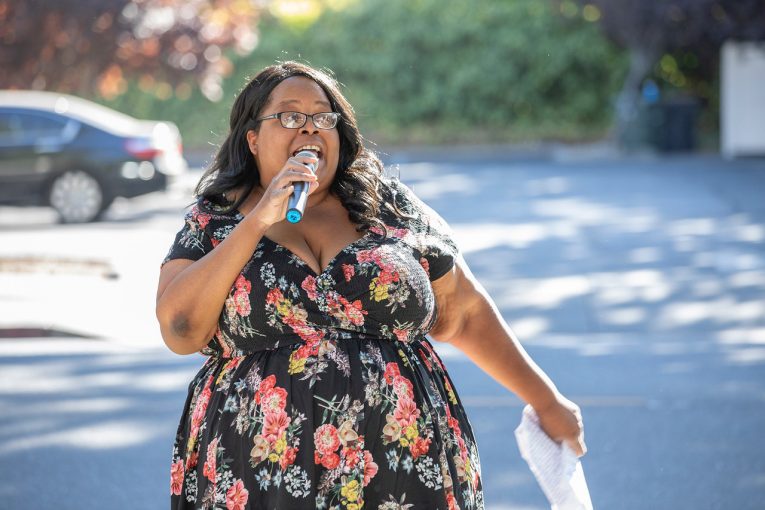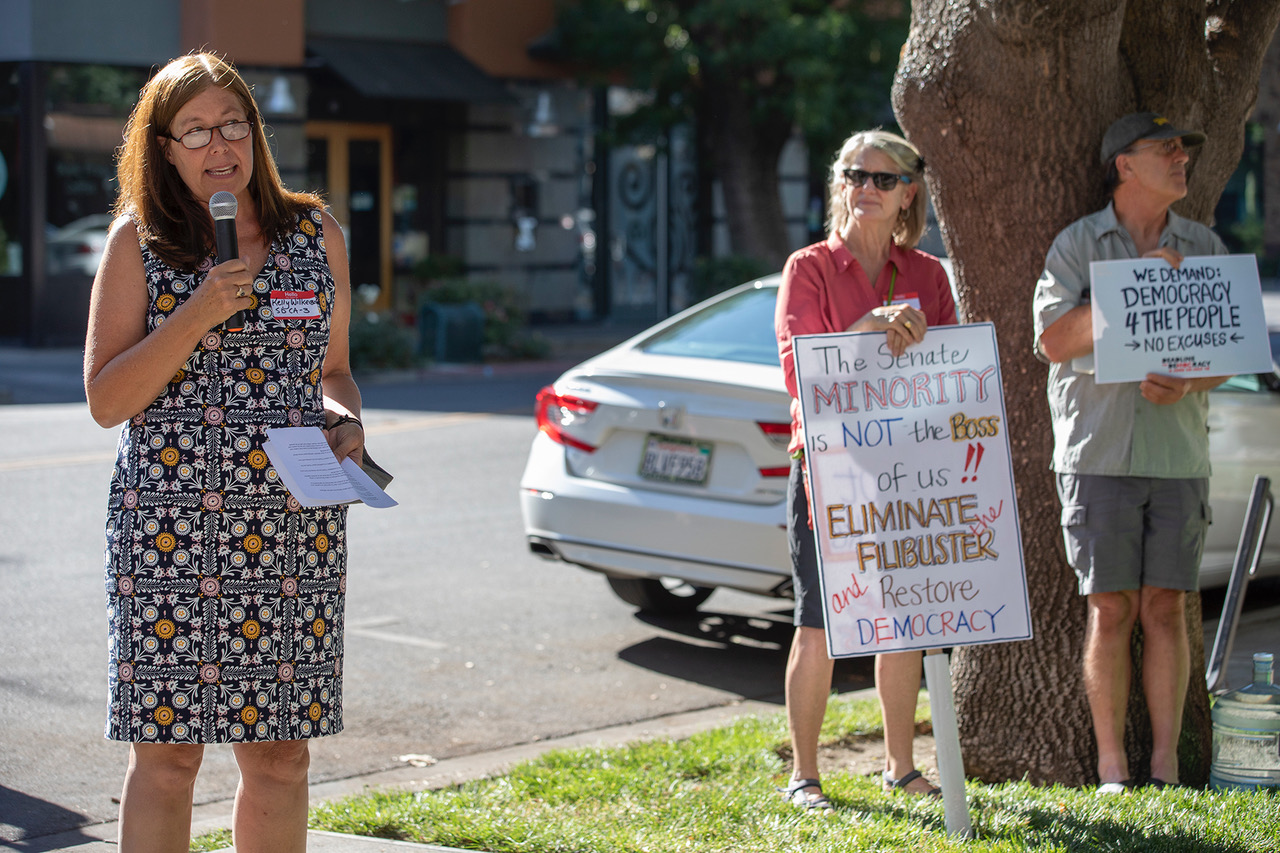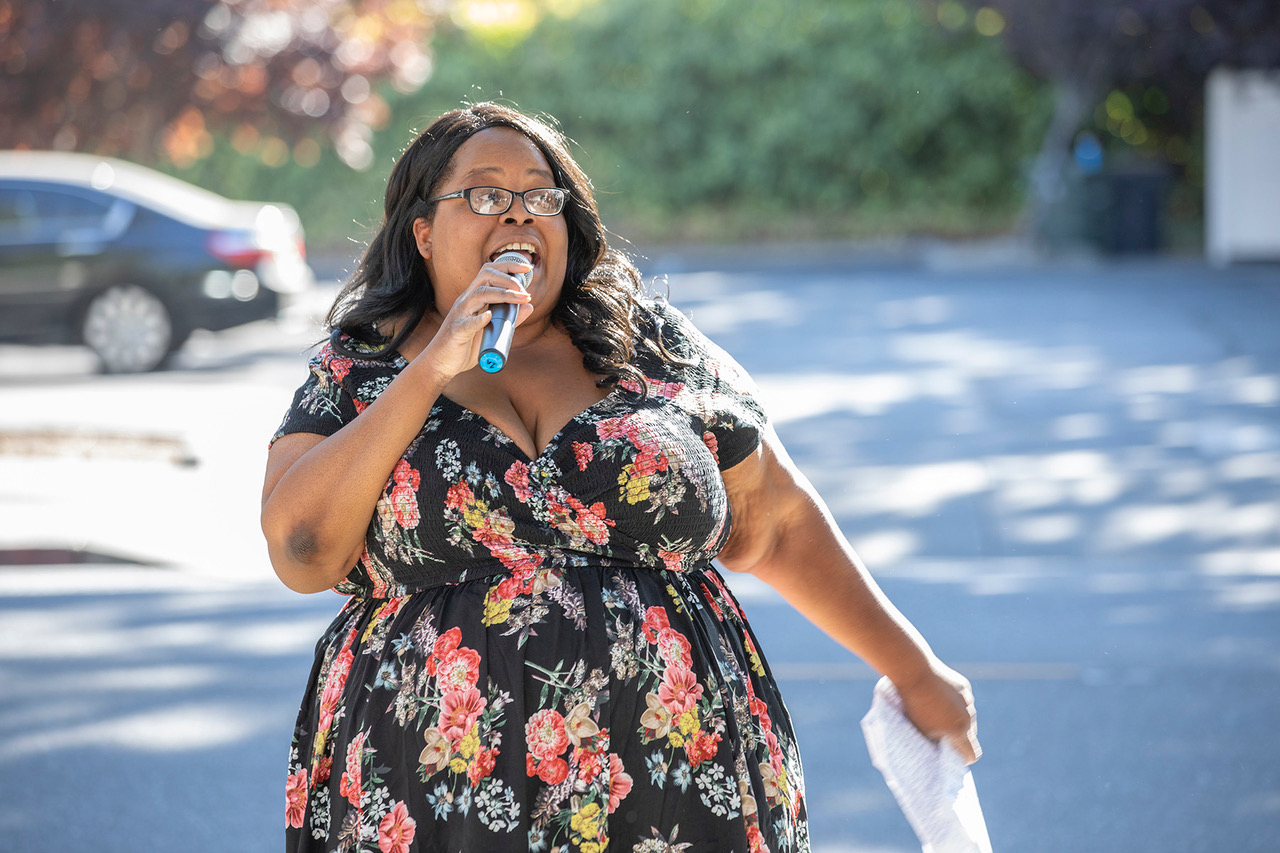

Special To the Vanguard
On Thursday July 8th, at a rally organized by Indivisible Yolo and Sister District CA3, over a hundred people gathered near the downtown Davis office of Congressman John Garamendi (D-CA3) to rally in support of the For the People Act, Senate Bill 1 (S.1). The bill passed the House in March (H.R.1), was filibustered by the Republican minority and will hopefully be taken up again this summer in the Senate.
S1 seeks to protect and expand voting rights, change campaign finance laws in order to reduce the influence of money in elections, address partisan gerrymandering and create ethics rules for federal officeholders. Indivisible believes that this summer is a make-it-or-break it moment for this bill to pass and for the very survival of US democracy. Supporters are urging Congress to pass the bill to counter what they see as voter suppression efforts taking place all over the country. Fair voting laws and eliminating dark money are supported by a majority of people across the political spectrum.
the political spectrum.
Along with Congressman Garamendi, a cosponsor of H.R.1, (see Vanguard 7/9), other speakers included Kelly Wilkerson, local organizer for Sister District CA-3; Kolieka Seigle, Northern California President of the National Organization of Women (NOW); Komal Hak, Davis League of Women Voters; Jennifer Roberts, Indivisible Colusa County; and Megan and Steve Murphy, organizers from Indivisible Yolo.
The rally began by organizers celebrating the high turnout in spite of the fact that it was a very hot day. Kelly Wilkerson described how engaged volunteers with Sister District work year round to get out the vote and support progressive candidates near and far. And how she grew up in conservative areas and learned that the American system of government was superior because it was a transparent process that we can trust, where every American has equal freedom to vote. According to Steve Murphy the very infrastructure of democracy is under attack as state legislatures around the country ignore the highest voter turnout in recent history and enact laws to make it harder to vote; therefore the Senate must move past the filibuster in June and take up, debate and pass S1 this summer while they still can. Kolieka Seigle pointed out that the filibuster has been used to maintain and uplift white supremacy, stop civil rights legislation including blocking anti-lynching legislation numerous times; is responsible for preventing the Dream Act from passing in 2010, and as President Barack Obama has said, it makes the country ungovernable in so many ways.

Komal Hak of the Davis League of Women Voters, a strong, non-partisan organization that has championed voting rights for over 100 years, explained that she is inspired by the clear support of S.1 expressed by Virginia Kase the CEO of the National League who testified at the Senate rules committee back in March saying, “S1- the For the People Act, is the transformational democracy reform package that makes elections fairer and restores power to the hands of the American people. This is pro-voter, anti-corruption legislation. The American people cannot wait for our democracy to fix itself.” Ms. Hak added that, “ it is time for the Senate to stand with the League’s mission of empowering voters and defending democracy. S1 must come to a full Senate vote and pass now. I am proud to be here today calling for our representatives to be firm in their commitment to support this bill.”
The final speaker of the day was Jennifer Roberts from Indivisible Colusa County holding a sign that read: “Senator Feinstein, Do the Right Thing, Pass S1.” She welcomed citizen activists from nearby rural areas like Arbuckle, Colusa, and Marysville, and urged everyone to call our California senators because they were elected by us and they are responsible to us. Our California Senators have the power to champion S1 with their more reticent colleagues and work to persuade them to vote for it. Although Senator Padillia has been clear and strong about S1 and the need to change the filibuster, Senator Feinstein has not. California voters should call on her to raise a firm and decisive voice in favor of this legislation. Ms. Roberts reminded the crowd that calling Senators in other states is actually counterproductive and that as Californians our job is to call our own Senators everyday and press them to prioritize this bill. Anyone interested in making calls and writing letters to the editor can find everything they need at the Indivisible Yolo “Deadline for Democracy” toolkit at https://linktr.ee/dothework2020.






No one is losing voting rights under the various state voting initiatives.
This is a false narrative.
Really? Convicted felons in Florida who lost their right to vote are sure having a hard time getting those rights back.
I see no problem with Florida’s felon voting rules:
A felony conviction in Florida for murder or a sexual offense makes a person ineligible to vote in Florida unless and until the person’s right to vote is restored by the State Clemency Board.
For any other felony conviction in Florida, a person is eligible to register and vote if the person has completed all terms of his or her sentence. Completion of the sentencemeans:
Prison or jail time;
Payment of the total amount of all fines, fees, costs, and restitution ordered as part of the felony sentence.
https://www.dos.myflorida.com/elections/for-voters/voter-registration/constitutional-amendment-4felon-voting-rights/
A felony conviction in another state makes a person ineligible to vote in Florida only if the conviction would make the person ineligible to vote in the state where the person was convicted.
An offense on which a person was not adjudicated guilty does not make a person ineligible to vote.
A misdemeanor conviction does not make a person ineligible to vote.
So, voters get to decide who and under what conditions others have the right to vote… what gives them that right? Oh, a vote of voters under the rules established by 50% + 1 of the voters, previously…
This is a wonderful slippery slope to a very interesting rabbit hole leading to a warren of countless tunnels…
Should the voters in Florida, and other states, band together to get Congress and the president to enact nation-wide laws to dictate that all states adopt the Florida procedures/rules? Should voters in Davis, or even Yolo County, California band together to get Congress and the president to enact nation-wide laws to dictate that all states adopt the California procedures/rules?
There is this…
Article 1, Sec 4, US constitution:
(Limited, at face value, to Federal offices voting, but a door appears to be open…)
15th Amendment, where the right to vote, in general (not just federal offices) was extended… interesting, CA was not one of the original states to ratify it… (source: A Century of Lawmaking for a New Nation: U.S. Congressional Documents and Debates, 1774 – 1875 (loc.gov))
19th amendment, where the right to vote, in general (not just federal offices) was extended…
24th and 26th amendments, where the right to vote, in general (not just federal offices) was extended…
All apparently gave the States leeway in how to implement, except as specifically required… hence, FL, CA, all other states have different nuances… it is as clear as mud, or a 1 foot chunk of obsidian, whether States have the right/responsibility to set further restrictions, as to who, time, place, and or manner for voting…
The current effort seems aimed at requiring all States to have the same rules as CA has or as some aspire those rules to be. Across the board… for Fed, State, local elections… not passing judgement, but it should be recognized for what it is… I ask the question, should it be left to the States, where the current controversy is, or should it all be under federal control? I opine that if it goes that way, it needs to be a Constitutional Amendment, not just legislation… Congress needs to ‘fish or cut bait’…
The Davis Vanguard should keep considering limiting comments to 3 per commenter.
Keith is correct, no one is losing voting rights because too many never had them in the first place. Further down in the commentary there is the sighting of the constitutional amendment for voting rights giving states power to determine who is eligible to vote. The states that demanded that the federal government not have a say, in who would and who could not vote, were majority slave states and some western states afraid of the “yellow peril” in the 1860’s.
Nope we have not stoped trying to stop people from voting. It is by some daring and a little luck that we have the “For the People Act ready to be passed. Now that Feinstein has gone loud in support of the act – we are that much closer to a filibuster carve out that will put voting rights over and above states rights, where they should be, where they are intended to be, in our democracy.
It’s possible that some of the commenters are avid independent minds and might benefit from this article on the origins and consequences of the racism behind voting suppression legislation then and now.
https://s-steward.medium.com/21st-century-impasse-for-democracy-595696ed3667
Just a random thought…
Sounds like voters want to dictate to other voters what they can or cannot do to dictate who can vote and how. Perhaps we should vote on it.
I don’t really care if murderers and sexual offenders vote or not, unless they become so numerous that they start voting in murderers and sexual offenders who overturn those offenses to no longer be criminal.
You guys are making this too hard. The voters of Florida passed an initiative to allow ex-felons, who are disproportionally minority to vote. The Republican controlled state government threw up additional roadblocks to them voting. Its clearly voter suppression of a predominately minority class of voters.
You’re looking too hard for scapegoats in order to try and justify your position. Read the rules I posted above, there’s nothing wrong with them and I feel most people have no problem with them.
Ron G…
It may be that the initiative was poorly written… perhaps it didn’t go far enough to prevent onerous “conditions”?
Perhaps they can do a “re-do” to correct the issues… if not, perhaps the FL folk find the ‘onerous conditions’ not so onerous… could it be that’s for them to determine?
Rationalizing obvious voter suppression doesn’t excuse it.
There’s no need to excuse it because it isn’t obvious voter suppression.
It’s just a false narrative that Democrats choose to put forward in order to try and secure the black vote.
Why not include ‘browns’, liberals, former felons (oh, probably repeated myself in some views)… oh, I guess ‘implied’…
What if, just supposing, in CA democrats voted along party lines to ban Republican and/or conservative voters from casting ballots, or making it more difficult? Voters, and their elected reps, could potentially do that could pass that type of legislation… and that would not be ‘voter suppression’, right? Obviously not… just ‘democracy’…
[edited]
The scenario that you’re putting forward here is ridiculous.
My 5th and last comment, BM has 5 too.
Call it a night BM.
Just a reminder: there is a limitation on comments per article—five comments per article per commenter per day.
If there is an actual conversation going with people participating in a non-rancorous manner, we’ve allowed it to continue. If it begins to be just back-and-forth abrasive comments without substance, it ends. Please act accordingly.
{rancorous back-and-forth abrasive comment without substance}
But only . . . #2